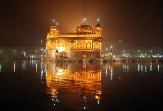

Water and Religion
The Golden Temple
The Sikh Golden Temple in
Amritsar. It is surrounded with
water containing Amrit, "Holy
Nectar."
Image Source (Creative Commons
Attribution ShareAlike 2.5)
The Sikh Golden Temple in
Amritsar. It is surrounded with
water containing Amrit, "Holy
Nectar."
Image Source (Creative Commons
Attribution ShareAlike 2.5)
^Back to Main Information Page
In many religions, water is considered to symbolize purity. Water is
used in ritual washing - "purification" - in Christianity, Hinduism, Islam,
Shinto, Taoism, Judaism, and other religions. Water is also important
to the Christian practice of Baptism.
In Judaism, water is used in Mikvah - ritual washing for various
purposes. In Sikhism, water is used to make Amrit, which is used in
Amrit Sanskar, a baptism-like initiation into the Khalsa. Muslims are
required to wash with water before doing ritual prayers or handling the
Qur'an in a process called wudu.
Some bodies of water are called sacred in many religions. Among
these are the Ganges River in Hinduism and the Well of Zamzam in
Islam. In Hinduism, water is also considered to be one of the 'basic five
elements' ("panch-tatva"s) along with fire, earth, space and air. The
Ancient Greek philosopher Empedocles said that water is one of 'four
classical elements' - the others being fire, earth and air. In traditional
Chinese philosophy, water is considered one of five elements along
with metal, wood, fire and earth.
Muslims believe that "We made from water every living thing." In other
words, it is believed that life is made from water (It is a fact that water is
essential to life, as you can learn about here). Even as far back as
Greek and Roman mythology, Peneus was a river god. There were also
three thousand Oceanids: daughters of the Titans Oceanus and
Tethys. Each Oceanid was said to watch over their own spring, lake,
river, cloud, etc.
As you can see, water is important in many religions. This page only
covers a little information about this subject - you can find many useful
links and learn more about water and religion on the links page, along
with many other subjects.
In many religions, water is considered to symbolize purity. Water is
used in ritual washing - "purification" - in Christianity, Hinduism, Islam,
Shinto, Taoism, Judaism, and other religions. Water is also important
to the Christian practice of Baptism.
In Judaism, water is used in Mikvah - ritual washing for various
purposes. In Sikhism, water is used to make Amrit, which is used in
Amrit Sanskar, a baptism-like initiation into the Khalsa. Muslims are
required to wash with water before doing ritual prayers or handling the
Qur'an in a process called wudu.
Some bodies of water are called sacred in many religions. Among
these are the Ganges River in Hinduism and the Well of Zamzam in
Islam. In Hinduism, water is also considered to be one of the 'basic five
elements' ("panch-tatva"s) along with fire, earth, space and air. The
Ancient Greek philosopher Empedocles said that water is one of 'four
classical elements' - the others being fire, earth and air. In traditional
Chinese philosophy, water is considered one of five elements along
with metal, wood, fire and earth.
Muslims believe that "We made from water every living thing." In other
words, it is believed that life is made from water (It is a fact that water is
essential to life, as you can learn about here). Even as far back as
Greek and Roman mythology, Peneus was a river god. There were also
three thousand Oceanids: daughters of the Titans Oceanus and
Tethys. Each Oceanid was said to watch over their own spring, lake,
river, cloud, etc.
As you can see, water is important in many religions. This page only
covers a little information about this subject - you can find many useful
links and learn more about water and religion on the links page, along
with many other subjects.
| Portal | Home | Information | QuickFacts | Links | Privacy © 2008-2010 H2O - CONTACT WEBMASTER REGARDING THIS SITE |

